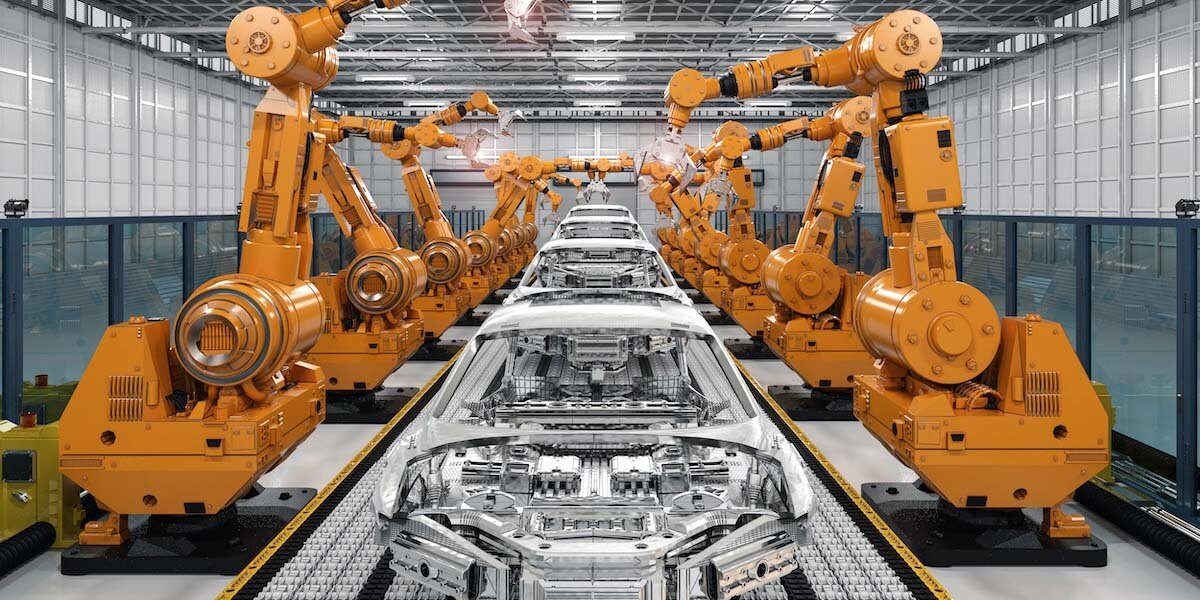From Product Cycle to Digital Thread
In order to survive, the auto industry needs to leverage 'digital threads’ that connect data from customers to dealers to products, & link R&D to production line & the aftermarket.

The arrival of new, fast-moving, tech-driven business models has disrupted many industries in the past decade as ‘Big Tech’ has demonstrated the value of putting data at the core of the business. These new models have unleashed repeated cycles of disruption on industries as diverse as travel, financial services and retail. Those that have prospered have done so by creating digital threads that link data from across their organisations and across the life cycle of products and services.
Until recently, the automotive industry has stayed ahead of the disruption curve and has seen profitable growth built upon R&D, razor-sharp focus on cost efficiencies and achieving economies of scale across their supply chains and manufacturing processes. However, global economic and technology trends, exacerbated by the COVID-19 pandemic, mean that these approaches are running out of steam. Balancing the need for further cost reductions whilst at the same time demanding greater flexibility and agility requires new approaches. Automotive companies can learn from those that have survived and prospered from the transformation of industries such as banking and retail by reimagining the way they orchestrate, integrate and wield data as a competitive asset.
“Data has been stockpiled for 20-30 years. Meanwhile, our main tools are PowerPoint, mail, sometimes Excel” – Global Services Manager at an automotive OEM customer
A new model is needed to compete in today’s digital economy. Automotive leaders should create a “digital thread” that connects data as a single comprehensive, complete and accurate enterprise asset. This involves not only collecting granular data at every opportunity, but dissolving silos held in different departments or by different systems so that all data can be combined, analysed and used to create value.
A “digital thread” connects data as a single comprehensive, complete and accurate enterprise asset.
Today, fragmented data are blocking innovation and the deployment of new business models. New efficiencies, cost savings and the flexibility and agility required to compete in global markets, all depend on integrated data. Although many are quick to look to machine learning and AI, automotive businesses must first create the right context and data environment for them to flourish. Far too many data analytics projects fail, or remain stuck at proof of concept stage, because there is simply no suitable platform to support them at production scale. Without the essential first step of orchestrating, integrating and managing data as a single asset individual projects, however brilliant, are not going to deliver the digital transformation needed to move the industry into the integrated digital world!
Granularity and scale of data are the foundation of Industry 4.0 transformations.
Modern businesses from retail to finance are discovering that creating digital threads and the enterprise data platforms capable of managing and maintaining them is the foundation for staying relevant and competitive. Big Tech, and increasingly the standout leaders across financial services, retail and other sectors put relevant data at the heart of their operations, and have created the analytics platforms that support real-time, predictive analytics at scale.
The digital thread concept has multiple applications and advantages for automotive businesses as they are faced with transformation across the industry. This series of blogs will explore how the experiences of those business that were forced to adapt to radical, high-velocity and high impact change in the last decade can help automotive businesses facing it now. We will look at how digital threads improve customer experience, help monetise data in the aftermarket, underpin effective smart factories and highly efficient yet flexible supply chains.
Reimagining data, not as a static resource, but as a living asset, will unlock opportunities not only to drive sustainable cost benefits, but new revenue streams and ways to create and satisfy new consumer demand.

Until recently, the automotive industry has stayed ahead of the disruption curve and has seen profitable growth built upon R&D, razor-sharp focus on cost efficiencies and achieving economies of scale across their supply chains and manufacturing processes. However, global economic and technology trends, exacerbated by the COVID-19 pandemic, mean that these approaches are running out of steam. Balancing the need for further cost reductions whilst at the same time demanding greater flexibility and agility requires new approaches. Automotive companies can learn from those that have survived and prospered from the transformation of industries such as banking and retail by reimagining the way they orchestrate, integrate and wield data as a competitive asset.
Data that move
For more than a century R&D, the production line along with service and spare part have provided three distinct phases in the model for automotive business processes. Although massive amounts of data are collected at each stage; from smart machines, sensors in vehicles and customer interactions, the vast majority sits in isolation. The vehicle moves along a physical path as it is designed, planned, produced, sold and used by the end customer, but the data generated and used at each point stays static. Data are disconnected, fragmented and rarely, or randomly shared or combined beyond, for example a single machine, a sub process or a plant.“Data has been stockpiled for 20-30 years. Meanwhile, our main tools are PowerPoint, mail, sometimes Excel” – Global Services Manager at an automotive OEM customer
A new model is needed to compete in today’s digital economy. Automotive leaders should create a “digital thread” that connects data as a single comprehensive, complete and accurate enterprise asset. This involves not only collecting granular data at every opportunity, but dissolving silos held in different departments or by different systems so that all data can be combined, analysed and used to create value.
A “digital thread” connects data as a single comprehensive, complete and accurate enterprise asset.
Today, fragmented data are blocking innovation and the deployment of new business models. New efficiencies, cost savings and the flexibility and agility required to compete in global markets, all depend on integrated data. Although many are quick to look to machine learning and AI, automotive businesses must first create the right context and data environment for them to flourish. Far too many data analytics projects fail, or remain stuck at proof of concept stage, because there is simply no suitable platform to support them at production scale. Without the essential first step of orchestrating, integrating and managing data as a single asset individual projects, however brilliant, are not going to deliver the digital transformation needed to move the industry into the integrated digital world!
From reporting to predicting
The digital thread concept overcomes bottlenecks and replaces manual or semi-manual work as data from one part of the life cycle or process flows to be used by another reducing repetition, copying and even paper-based transfer of information from one system to another. However, its real impact is more fundamental. Granularity and scale of data are the foundation of Industry 4.0 transformations, customer journey, and digital transformation of the product creation process. Automotive leaders are moving from seeing data as business information and reporting, to become the fuel for analytical approaches that will deliver step-change improvements to existing processes and complete business model innovation. The real value comes when the digital thread connects relevant data from across the business to reveal entirely new approaches and sources of value. The more far-sighted already appreciate the opportunity and potential of extending these digital threads not only throughout the organisation, but into supply chains and even to consumers and other stakeholders.Granularity and scale of data are the foundation of Industry 4.0 transformations.
Modern businesses from retail to finance are discovering that creating digital threads and the enterprise data platforms capable of managing and maintaining them is the foundation for staying relevant and competitive. Big Tech, and increasingly the standout leaders across financial services, retail and other sectors put relevant data at the heart of their operations, and have created the analytics platforms that support real-time, predictive analytics at scale.
The digital thread concept has multiple applications and advantages for automotive businesses as they are faced with transformation across the industry. This series of blogs will explore how the experiences of those business that were forced to adapt to radical, high-velocity and high impact change in the last decade can help automotive businesses facing it now. We will look at how digital threads improve customer experience, help monetise data in the aftermarket, underpin effective smart factories and highly efficient yet flexible supply chains.
Reimagining data, not as a static resource, but as a living asset, will unlock opportunities not only to drive sustainable cost benefits, but new revenue streams and ways to create and satisfy new consumer demand.

Stay in the know
Subscribe to get weekly insights delivered to your inbox.
